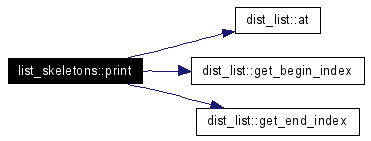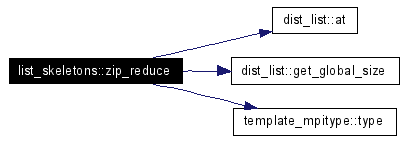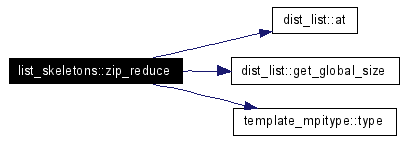|
Static Public Member Functions |
| template<typename F, typename A> |
static dist_list< typename
F::result_type > * | map (const F &f, const dist_list< A > *as) |
| | Map skeleton applies the function to each element.
|
| template<typename F, typename A> |
| static void | map (const F &f, const dist_list< A > *as, dist_list< typename F::first_argument_type > *bs) |
| | Map skeleton applies the function to each element.
|
| template<typename F, typename A> |
| static void | map_ow (const F &f, dist_list< A > *as) |
| | Map skeleton applies the function to each element.
|
| template<typename F, typename A> |
static dist_list< typename
F::result_type > * | mapindex (const F &f, const dist_list< A > *as) |
| | Mapindex skeleton applies the function to each element. The function takes the index of the element for an argument.
|
| template<typename F, typename A> |
| static void | mapindex (const F &f, const dist_list< A > *as, dist_list< typename F::first_argument_type > *bs) |
| | Mapindex skeleton applies the function to each element. The function takes the index of the element for an argument.
|
| template<typename F, typename A> |
| static void | mapindex_ow (const F &f, dist_list< A > *as) |
| | Mapindex skeleton applies the function to each element. The function takes the index of the element for an argument.
|
| template<typename OPLUS, typename A> |
| static A | reduce (const OPLUS &oplus, const A &e, const dist_list< A > *as) |
| | Reduce skeleton reduces the list into one element by applying a binary operator.
|
| template<typename OPLUS, typename A> |
| static void | reduce (const OPLUS &oplus, const A *e, const dist_list< A > *as, A *retval) |
| | Reduce skeleton reduces the list into one element by applying a binary operator.
|
| template<typename A, typename OPLUS> |
| static dist_list< A > * | scan (const OPLUS &oplus, const A &e, const dist_list< A > *as) |
| | Scan skeleton performs the prefix-sum like computation by applying a binary operator.
|
| template<typename OPLUS, typename A> |
| static void | scan (const OPLUS &oplus, const A *e, const dist_list< A > *as, dist_list< A > *bs) |
| | Scan skeleton performs the prefix-sum like computation by applying a binary operator.
|
| template<typename A, typename OPLUS> |
| static dist_list< A > * | scanr (const OPLUS &oplus, const A &e, const dist_list< A > *as) |
| | Scanr skeleton performs the postfix-sum like computation by applying a binary operator in the opposed way against scan.
|
| template<typename OPLUS, typename A> |
| static void | scanr (const OPLUS &oplus, const A *e, const dist_list< A > *as, dist_list< A > *bs) |
| | Scanr skeleton performs the postfix-sum like computation by applying a binary operator in the opposed way against scan.
|
| template<typename A, typename OPLUS> |
| static dist_list< A > * | prescan (const OPLUS &oplus, const A &e, const dist_list< A > *as) |
| | Prescan skeleton performs the prefix-sum like computation by applying a binary operator.
|
| template<typename OPLUS, typename A> |
| static void | prescan (const OPLUS &oplus, const A *e, const dist_list< A > *as, dist_list< A > *bs) |
| | Prescan skeleton performs the prefix-sum like computation by applying a binary operator.
|
| template<typename A, typename OPLUS> |
| static void | prescan_ow (const OPLUS &oplus, const A &e, dist_list< A > *as) |
| | Prescan skeleton performs the prefix-sum like computation by applying a binary operator.
|
| template<typename A, typename OPLUS> |
| static dist_list< A > * | prescanr (const OPLUS &oplus, const A &e, const dist_list< A > *as) |
| | Prescanr skeleton performs the prefix-sum like computation by applying a binary operator in the oppsed way ageinst prescan.
|
| template<typename OPLUS, typename A> |
| static void | prescanr (const OPLUS &oplus, const A *e, const dist_list< A > *as, dist_list< A > *bs) |
| | Prescanr skeleton performs the prefix-sum like computation by applying a binary operator in the oppsed way ageinst prescan.
|
| template<typename A, typename OPLUS> |
| static void | prescanr_ow (const OPLUS &oplus, const A &e, dist_list< A > *as) |
| | Prescanr skeleton performs the prefix-sum like computation by applying a binary operator in the oppsed way ageinst prescan.
|
| template<typename A, typename B> |
static dist_list< std::pair<
A, B > > * | zip (const dist_list< A > *as, const dist_list< B > *bs) |
| | Zip skeleton accepts two list and returns an list whose elements are pairs.
|
| template<typename A, typename B> |
| static void | zip (const dist_list< A > *as, const dist_list< B > *bs, dist_list< std::pair< A, B > > *cs) |
| | Zip skeleton accepts two list and returns an list whose elements are pairs.
|
| template<typename F, typename A, typename B> |
static dist_list< typename
F::result_type > * | zipwith (const F &f, const dist_list< A > *as, const dist_list< B > *bs) |
| | Zipwith skeleton applies the function to each pair of two lists, and is equivalent to the map skeleton after zip skeleton.
|
| template<typename F, typename A, typename B> |
| static void | zipwith (const F &f, const dist_list< A > *as, const dist_list< B > *bs, dist_list< typename F::first_argument_type > *cs) |
| | Zipwith skeleton applies the function to each pair of two lists, and is equivalent to the map skeleton after zip skeleton.
|
| template<typename F, typename A, typename B> |
static dist_list< typename
F::result_type > * | zipwithindex (const F &f, const dist_list< A > *as, const dist_list< B > *bs) |
| | Zipwithindex skeleton applies the function to each corresponding pair of two lists, furthermore, the function takes the index of the pair for the first argument.
|
| template<typename F, typename A, typename B> |
| static void | zipwithindex (const F &f, const dist_list< A > *as, const dist_list< B > *bs, dist_list< typename F::first_argument_type > *cs) |
| | Zipwithindex skeleton applies the function to each corresponding pair of two lists, furthermore, the function takes the index of the pair for the first argument.
|
| template<typename A> |
| static dist_list< A > * | shiftr (const A &firstval, const dist_list< A > *as) |
| | Shiftr skeleton shifts the input list to the right.
|
| template<typename A> |
| static void | shiftr_ow (const A &firstval, dist_list< A > *as) |
| | Shiftr skeleton shifts the input list to the right. This function overwrites the input list.
|
| template<typename A> |
| static dist_list< A > * | shiftl (const A &lastval, const dist_list< A > *as) |
| | Shiftl skeleton shifts the input list to the left.
|
| template<typename A> |
| static void | shiftl_ow (const A &lastval, dist_list< A > *as) |
| | Shiftl skeleton shifts the input list to the left. This function overwrites the input list.
|
| template<typename G, typename P, typename OPLUS, typename Q, typename OTIMES, typename A> |
| static P::result_type | accumulate (const G &g, const P &p, const OPLUS &oplus, const Q &q, const OTIMES &otimes, const typename G::argument_type &e, const dist_list< A > *as) |
| | Accumulate skeleton is an implementation for the parallelizable recursive function.
|
| template<typename G, typename P, typename OPLUS, typename Q, typename OTIMES, typename A> |
| static void | accumulate (const G &g, const P &p, const OPLUS &oplus, const Q &q, const OTIMES &otimes, const typename G::second_argument_type *e, const dist_list< A > *as, typename P::first_argument_type *retval) |
| | Accumulate skeleton is an implementation for the parallelizable recursive function.
|
| template<typename A> |
| static void | gather (const dist_list< A > *as, A *array) |
| | Gathers the distributed list to rank 0 process.
|
| template<typename A> |
| static void | print (const dist_list< A > *as, std::ostream &stream=std::cout) |
| | Prints out the whole list.
|
| template<typename A> |
| static void | print (const dist_list< A > *as, int index, std::ostream &stream=std::cout) |
| | Prints out the index-th element.
|
| template<typename OPLUS, typename P, typename A> |
| static P::result_type | cataj (const OPLUS &oplus, const P &p, const typename P::result_type &e, const dist_list< A > *as) |
| template<typename OPLUS, typename P, typename A> |
| static void | cataj (const OPLUS &oplus, const P &p, const typename P::first_argument_type *e, const dist_list< A > *as, typename P::first_argument_type *retval) |
| template<typename OPLUS, typename A, typename B> |
| static std::pair< A, B > | zip_reduce (const OPLUS &oplus, const std::pair< A, B > &e, const dist_list< A > *as, const dist_list< B > *bs) |
| template<typename OPLUS, typename A, typename B> |
| static void | zip_reduce (const OPLUS &oplus, const std::pair< A, B > *e, const dist_list< A > *as, const dist_list< B > *bs, std::pair< A, B > *result) |
| template<typename F, typename OPLUS, typename A, typename B> |
| static F::result_type | zipwith_reduce (const F &f, const OPLUS &oplus, const typename F::result_type &e, const dist_list< A > *as, const dist_list< B > *bs) |
| template<typename F, typename OPLUS, typename A, typename B> |
| static void | zipwith_reduce (const F &f, const OPLUS &oplus, const typename F::result_type *e, const dist_list< A > *as, const dist_list< B > *bs, typename F::result_type *result) |







































 1.4.4
1.4.4